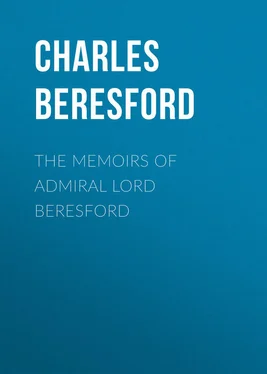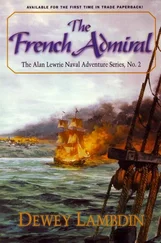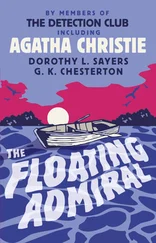Charles Beresford - The Memoirs of Admiral Lord Beresford
Здесь есть возможность читать онлайн «Charles Beresford - The Memoirs of Admiral Lord Beresford» — ознакомительный отрывок электронной книги совершенно бесплатно, а после прочтения отрывка купить полную версию. В некоторых случаях можно слушать аудио, скачать через торрент в формате fb2 и присутствует краткое содержание. Жанр: foreign_antique, foreign_prose, на английском языке. Описание произведения, (предисловие) а так же отзывы посетителей доступны на портале библиотеки ЛибКат.
- Название:The Memoirs of Admiral Lord Beresford
- Автор:
- Жанр:
- Год:неизвестен
- ISBN:нет данных
- Рейтинг книги:5 / 5. Голосов: 1
-
Избранное:Добавить в избранное
- Отзывы:
-
Ваша оценка:
- 100
- 1
- 2
- 3
- 4
- 5
The Memoirs of Admiral Lord Beresford: краткое содержание, описание и аннотация
Предлагаем к чтению аннотацию, описание, краткое содержание или предисловие (зависит от того, что написал сам автор книги «The Memoirs of Admiral Lord Beresford»). Если вы не нашли необходимую информацию о книге — напишите в комментариях, мы постараемся отыскать её.
The Memoirs of Admiral Lord Beresford — читать онлайн ознакомительный отрывок
Ниже представлен текст книги, разбитый по страницам. Система сохранения места последней прочитанной страницы, позволяет с удобством читать онлайн бесплатно книгу «The Memoirs of Admiral Lord Beresford», без необходимости каждый раз заново искать на чём Вы остановились. Поставьте закладку, и сможете в любой момент перейти на страницу, на которой закончили чтение.
Интервал:
Закладка:
When, in later years, I became commander-in-chief, I made it a rule that all admirals and captains should have direct access to myself, no matter how trifling the occasion.
In those days, there was a turnpike-gate outside the town. I was driving a brother officer home late one night, after dining at a house some distance away and when we came to the toll-gate, the keeper was in bed, and all my knocking and shouting failed to wake him up. So I proceeded to heave a large stone through his window. That fetched him; and down he came, grumbling and swearing. I thrust a sovereign – the only coin I had – into his hand to pay for his broken window and the toll. It was bad tactics, for he promptly retreated into his house (with my sovereign) leaving us still on the wrong side of the gate. There was nothing for it but to break the rest of his windows, but still he wouldn't come out. Evidently a surly fellow, unfit to take charge of turnpike gates, an office demanding tact and courtesy; and we thought it well to remove his temptation. So my companion and I wrenched the gate from its hinges and lashed it to the cart, vertically, so that it projected over our heads like a kind of ornamental roof, its weight nearly lifting the mare between the shafts off her legs and making her kick like blazes. Then we drove into Plymouth, gate and all. The gate was reduced to firewood before sunrise. Next day, the town was placarded with vain offers of reward for information concerning "some evil-disposed person or persons unknown who," etc.
At that time, I used to ride steeple-chases whenever I had an opportunity, and kept myself in regular training by hard exercise; a habit which on one occasion involved the commander-in-chief in an alarming rumour. It arose from the trifling circumstance that I had borrowed his overcoat. The Fleet was at Holyhead, to celebrate the opening of the new breakwater by the Prince of Wales; I was just going for a training run up and down that breakwater, when, finding I had no coat, I took Sir Harry Keppel's uniform overcoat. I took it, without thinking, merely because I wanted it. The next thing that happened was that the signalmen in the Fleet reported that the Admiral must have gone mad on the breakwater, seeing that he was racing up and down it clad in a shooting-cap, grey trousers, muffler and uniform overcoat. As my face was almost hidden by cap and muffler, the signalmen were deceived by the gold lace, took me for the admiral, and thought that poor Sir Harry was smitten with insanity.
We used to hunt a good deal with the Dartmoor hounds; and upon a day when there was no run, and everyone was bored, one of the ladies present begged me to provide some kind of sport, kindly suggesting that I should personate the fox, a part I declined.
"You must do something to amuse us," she said.
"Very well, I will," said I.
Among the officers there were an elderly admiral and an elderly general, and I pointed them out to the lady.
"I will get up a race between the two of them," said I.
She bet me I would not, and I took it. I began with the soldier.
Ambling alongside the general, I asked him casually if he had ridden much in his life.
"Of course I have," says he irritably. "What do you mean, sir?"
"Nothing at all," says I. "I thought I would ask. The admiral – "
"What about the admiral?" cries the general, staring suspiciously at the distant and unconscious officer.
"He was saying he didn't think you knew very much about a horse."
The general lost his temper. He swore. He said he would show the admiral what he knew about a horse.
"You can easily prove it," said I; and before he understood what was happening, he had agreed to ride a race. Then I went over to the admiral.
"Do you know what the general says? He says you look like a monkey on a horse," said I; and it was the admiral's turn to swear.
"D – d impertinence!" says he. "I'll race him, and beat him any day in the week." And he continued to use forcible language.
"You can do that," I said, for the admiral was riding one of my best horses.
"If you really want a race, I'll arrange the whole thing," said I. And I brought the two wrathful old gentlemen together, rode with them to the starting-point, gave the word, and off they went as hard as they could pelt. I followed, cheering them on. The general began to draw ahead, when his horse baulked at a soft place. The admiral's horse did the same, throwing his rider upon his neck.
"Get back into the saddle and he'll go through," I shouted, for I knew the horse. The admiral hove himself into his seat, and won the race. He wouldn't have won, if his adversary hadn't baulked.
The members of the Board of Admiralty came down to Plymouth to witness the autumn military manoeuvres. I offered to drive them all in my coach; and they were settled in their places – Mr. Goschen the First Lord, Admiral Sir Alexander Milne, the Earl of Camperdown and Mr. Shaw-Lefevre – when out of the house came Rear-Admiral Beauchamp Seymour.
"Get down!" he shouted. "Gentlemen, you must get down."
They asked him why.
"You don't know that boy," said Seymour. "He's not safe. He'll upset you on purpose, just to say he's upset the whole Board of Admiralty!"
And he actually ordered my guests off my coach, so that they had to go in barouches.
Sir Harry Keppel often came sailing with me in my little yacht. We were out together, when I said to him,
"I cannot weather that ironclad, sir."
"Then run into her, my dear boy," said Keppel placidly.
"All right, sir – obey orders."
I held on, and we cleared the jib-boom of the ironclad by an inch.
Sir Harry had an old friend of his to stay with him, Captain Clifton, a most remarkable and interesting man. In the old days, the passage for the opium trade existing between China and India was taken only once a year – the opium ships running up to China with one monsoon and down to India with the other. Clifton went to the Government of India and undertook, if the Government would permit him to build vessels to his own design, to build clippers to thrash up against the monsoon as well as run before it, and so double the income accruing from the opium trade. The Government consenting, Clifton designed the Blue Jacket and the Red Jacket and vessels of that class, which were the famous opium clippers of the "roaring forties" and fifties.
The Indian Government gave Captain Clifton a lakh of rupees. On his way home, Clifton, touching at what is now the city of Melbourne in Australia, but which was then a small assemblage of wooden shanties, noticed the possibilities of the magnificent harbour. He told me that he could have bought the whole site of Melbourne for a lakh; but on consideration, he decided against the project.
One of my great friends, Sir Allan Young, a brilliant seaman of the old school, commanded, at the age of twenty-four, one of Clifton's opium clippers.
Upon the occasion of the Prince of Wales's opening the new breakwater at Holyhead, in 1873, his Royal Highness was entertained together with a large party at a country house in the neighbourhood. The Prince called to me, and said:
"This is very slow. You really must do something to enliven the proceedings."
"Well, sir," said I, "I will run a hundred yards race with Lord – . As he is Irish, he is sure to take me up if I challenge him."
Sure enough, Lord – accepted the challenge, but on conditions. These were: that I should race in full uniform, excepting my sword, while himself should "take his wardrobe from off himself." Lord – then proceeded to divest himself there and then of his Patrick ribbon, coat, waistcoat, and boots, which he confided to the care of the wife of a certain distinguished Liberal statesman. He dropped his Patrick ribbon into her lap, saying:
Читать дальшеИнтервал:
Закладка:
Похожие книги на «The Memoirs of Admiral Lord Beresford»
Представляем Вашему вниманию похожие книги на «The Memoirs of Admiral Lord Beresford» списком для выбора. Мы отобрали схожую по названию и смыслу литературу в надежде предоставить читателям больше вариантов отыскать новые, интересные, ещё непрочитанные произведения.
Обсуждение, отзывы о книге «The Memoirs of Admiral Lord Beresford» и просто собственные мнения читателей. Оставьте ваши комментарии, напишите, что Вы думаете о произведении, его смысле или главных героях. Укажите что конкретно понравилось, а что нет, и почему Вы так считаете.












